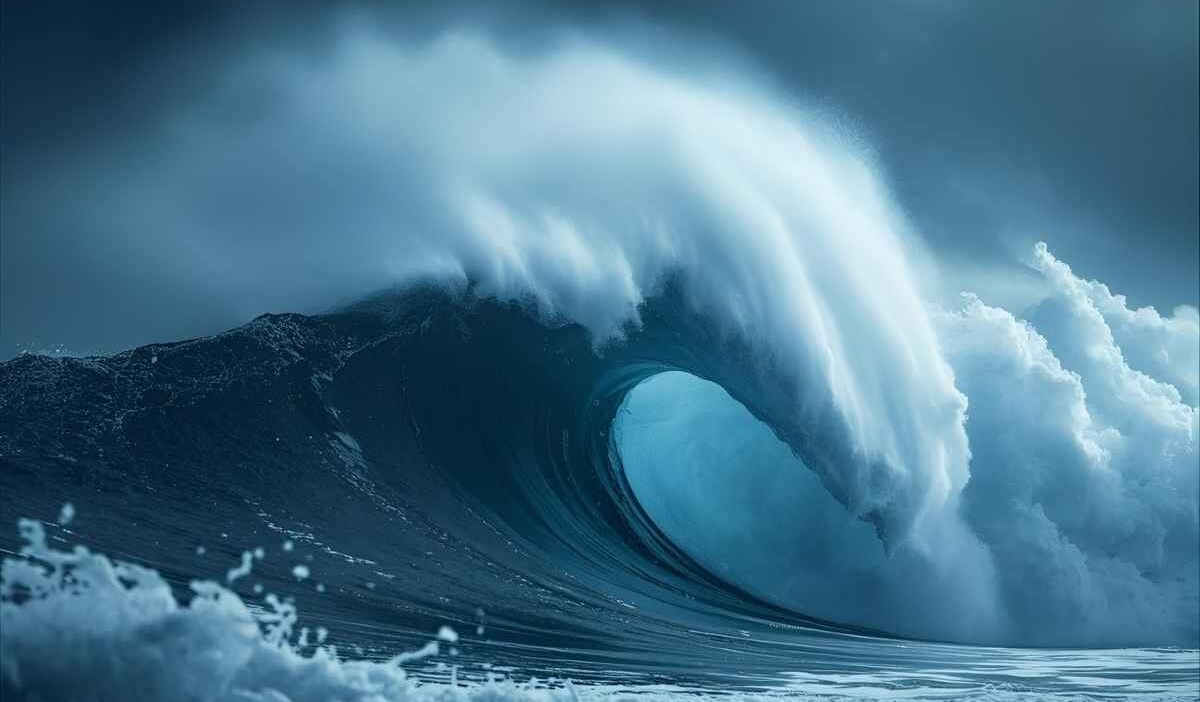If you dream of a tsunami, it often signifies that you are—or will be—experiencing powerful emotional shifts, inner turmoil, or life upheaval. The tsunami in dream meaning typically points to feeling overwhelmed, yet it can also suggest transformation, renewal, or the surfacing of hidden truths.
Dreams of tsunamis are deeply fascinating because they tap into universal imagery of water, destruction, and rebirth. When our mind conjures a massive wave, it’s often speaking in symbolic, emotional language. In this article, we’ll explore what tsunami in dream meaning reveals psychologically, spiritually, and culturally. We’ll examine general interpretations, common dream variations (e.g. being consumed, surviving, watching), and a real-life case study. Then we’ll dive into historical and cultural symbolism, and finally offer psychological tools and personal growth suggestions. By the end, you’ll better understand how your subconscious might be signaling change and how to harness that insight for growth.
General Meaning, Symbolism & Interpretation of “Tsunami in Dream Meaning”
When trying to parse the tsunami in dream meaning, it’s helpful to consider how powerful images of water and waves function in dream symbolism.
Symbolism of Water, Waves & Tsunamis
- Water in dreams is often tied to emotions, the unconscious, and the ebb and flow of inner life (a common interpretation in Jungian psychology).
- A tsunami is an extreme version of water imagery — a colossal force, often sudden and destructive, which suggests something overwhelming in the dreamer’s psyche.
- Because tsunamis are so dramatic, the dream may reflect life events or internal dynamics that feel out of control or beyond one’s capacity to contain.
Psychological Interpretation
From a psychological perspective, tsunami dreams often surface when one is grappling with repressed emotions, unresolved trauma, or intense stress:
- Freudian view: Some dream theorists build on Freud’s idea of dreams as conveyors of repressed thoughts or emotions. A tsunami may represent feelings that have built up over time and are now crashing into awareness.
- Jungian / analytic view: Carl Jung considered water an image of the unconscious. The tsunami might be a call from the unconscious to confront deeper emotional material. In Jungian terms, such dreams can play a compensatory role — balancing what is repressed in waking life. Wikipedia+2Mindberg+2
- Modern psychological view: Contemporary dream analysts often see such dreams as signals of internal pressure — anxiety, overwhelm, or transitions needing emotional processing. wellbeing.com.au+3Centre of Excellence+3Practical Psychology+3
Spiritual & Transformational Meaning
Beyond the psychological, a tsunami in dream meaning can carry spiritual or symbolic messages:
- Cleansing & rebirth: The destructive power of water can wash away what is stagnant or limiting, making space for new growth.
- Transformation: The wave may represent a shift in identity, a spiritual “rebirth,” or the ending of one life phase and the beginning of another.
- Inner awakening: Some spiritual interpreters believe tsunami dreams emerge when the soul is pushing for integrity, urging the dreamer to surrender, release barrier patterns, or attune to deeper truth. Medium+1
In sum, the general symbolism of tsunami in dream meaning conveys a potent mixture of emotional upheaval, transformation, and the call to face internal depths. Whether frightening or awe-invoking, it invites you to pay attention to what your deeper self is urging you to address.
Common Variations of Tsunami Dreams & Their Interpretations
Dreams featuring tsunamis may unfold in many forms. Below are several common variations with interpretations from different angles (positive and negative).
1. Being Consumed or Drowned by the Tsunami
Negative angle:
- Feeling powerless, overwhelmed, or that emotional burdens have become too much to handle.
- A signal of suppressed anxiety, grief, guilt, or trauma.
- Fear of losing control in some area of your life (relationships, work, health).
Positive angle / growth potential:
- Symbolically “dying” to an old self so a new one can emerge.
- Invitation to surrender to emotions, letting them move rather than suppressing them.
- If you survive the drowning, it may show your resilience and capacity for renewal. Mindberg+3Practical Psychology+3Auntyflo.com+3
2. Watching a Tsunami from Afar / Observing
Negative angle:
- You may be avoiding or dissociating from deep emotions rather than engaging with them.
- A sense of helplessness, unable to intervene, or witnessing turmoil in your life or others’.
Positive angle:
- The observer position suggests detachment or insight — you might be consciously witnessing emotions from a safe distance, gaining perspective.
- This may denote readiness to understand patterns without being overwhelmed. wellbeing.com.au+2Centre of Excellence+2
3. Surviving the Tsunami / Reaching Higher Ground
Positive angle:
- Survivorship in a tsunami dream is often a strong sign of resilience, adaptation, and personal strength.
- It shows you can navigate emotional extremes and still regain footing.
- Climbing to higher ground or finding safety can represent gaining clarity, emotional balance, or spiritual elevation.
Caution / nuance:
- If survival feels tenuous or delayed, it might reflect your fear you’re only just clinging on, rather than thriving.
4. Riding, Swimming, or Surfing the Tsunami
Positive angle:
- This rare but potent scenario suggests mastery and flow — you’re integrating powerful emotions and navigating change with confidence.
- It can symbolize emotional maturity and trust in your deeper self.
Caution:
- If riding feels unstable or frightening, it may reflect anxiety about handling life’s waves too soon. wellbeing.com.au+2Auntyflo.com+2
5. Tsunami at a Wedding, Birthday, or Special Occasion
- These special settings amplify the meaning:
Wedding tsunami dream:
- Might signal deep emotional upheaval around commitment, merging of lives, identity shifts.
- Could point to fear, hidden tension, or transformation happening within the union.
Birthday tsunami dream:
- Birthdays evoke themes of aging, life cycles, personal evolution. A tsunami here suggests a major turning point or “rebirth” is underway.
- May reflect anxiety or excitement about growing older, making life changes, or the pressure of expectations.
In both scenarios, the tsunami motif blends the emotional weight of the occasion with deeper subconscious currents — you may be wrestling with personal evolution or relational metamorphosis.
Real-Life Case Study / Example
Here is a realistic example (adapted for confidentiality) illustrating tsunami in dream meaning in action:
Case: Sarah (age 34) was going through a turbulent phase: she’d recently left a long-term job, was navigating uncertainty in her romantic life, and felt anxious about identity and purpose.
Over several nights, she dreamed of a massive tsunami sweeping across her town — she watched houses being destroyed, felt panic trying to run but was partially paralyzed by fear. On one night, she dove into the wave and was carried under; on another, she watched from a rooftop, powerless to stop it.
In therapy and dreamwork, Sarah realized the tsunami represented the emotional collapse of her old life pattern — the safety she’d clung to was eroding. Her repeated drownings stood for her fear of being consumed by change; her observer position signified her attempt to keep distance emotionally.
Over time, Sarah began journaling her dream images, exploring what “houses” and “shorelines” meant to her (her sense of home, identity). She practiced mindfulness to stay with fear rather than avoiding it. Eventually she had a further dream: she rode the crest of a wave — not smoothly, but deliberately — and felt exhilarated. This marked a turning point: she felt more acceptance of transformation and willingness to live in flux.
This case illustrates how tsunami in dream meaning can evolve over time: from fear and overwhelm toward integration, insight, and emotional resilience.
Cultural & Historical Symbolism of Tsunami Dreams
To deepen your understanding of tsunami in dream meaning, it helps to see how waves, floods, and tsunamis appear across mythology, religion, and culture.
Mythology & Religion
- In many mythic traditions, water — especially its chaotic forces — represents primordial beginnings, destruction before creation, or divine cleansing.
- In Biblical and Abrahamic imagery, floods carry both judgment and renewal (e.g. Noah’s ark). While not exactly tsunamis, the motif of deluge echoes themes of moral reckoning and rebirth.
- In Hindu mythology, cosmic floods and oceanic churning (Samudra Manthan) point to cycles of destruction and renewal.
- In Islamic dream lore, dreams about large bodies of water (especially saltwater) are often interpreted as trials or hardship, with the possibility of purification or warning. Medium
Cultural & Literary References
- In literature and art, tsunamis or giant waves often stand as metaphors for unstoppable change, hubris, or nature’s ultimate power.
- In modern culture, disaster films or stories of tidal waves evoke our collective anxiety about forces beyond human control — climate change, civilization collapse, emotional breakdowns.
Etymology & Semantic Roots
- The word tsunami is Japanese (津波), literally meaning “harbor wave.” The term entered global usage in recent decades, especially as awareness of Pacific seismic wave disasters grew.
- While the modern term is fairly new, cross-cultural traditions have long used flood and wave motifs to symbolize emotional or spiritual crises.
Across cultures and epochs, water disasters often serve as symbolic language: forces that wipe clean, test resilience, and prompt rebirth. That pattern resonates powerfully when you experience a recurrent tsunami in dream meaning.
Psychological Insights & Personal Growth Practices
Understanding tsunami in dream meaning can be not just interesting, but transformative — if you approach your dreams as guides rather than threats. Here are strategies and advice to deepen insight and promote psychological growth:
1. Dream Journaling & Reflection
- Record your tsunami dreams immediately upon waking — details matter: color of water, your feelings, your actions, surroundings.
- Over time, patterns emerge. You may notice recurring symbols or emotional themes.
- Ask probing questions: Where was I in the dream? What were my relationships to objects or people? What was I resisting or embracing?
2. Mindfulness & Emotion Work
- Use meditative practices to sit with discomfort rather than flee from it. Let the imagery move through your psyche.
- When intense emotions arise in waking life, pause and ask: Is this my tsunami? What is it trying to tell me?
- Grounding techniques (breathing, body scans) help when dream material feels too overwhelming.
3. Therapy, Dreamwork & Integration
- If tsunami dreams are recurring or emotionally distressing, working with a therapist or a dreamworker can help you unpack deeper layers.
- Use amplification (bringing in mythic, symbolic, or archetypal associations) and active imagination (dialogue with dream figures) to bring meaning to the imagery.
- Integrate insights by making small, concrete changes: set boundaries, address repressed feelings, reorganize your life around your deeper needs.
4. Cultivating Resilience & Agency
- Remind yourself: a tsunami in a dream is not prophecy — it is symbolic. You hold agency to respond and transform.
- Build emotional resources: support networks, healthy routines, creative expression.
- When you dream of “surfing” or riding the wave, you can treat that as a goal — not in grand leaps, but by gradually accepting and walking with your emotional depths.
With intention and practice, your tsunami in dream meaning can shift from a frightening harbinger to a powerful invitation to inner growth.
Frequently Asked Questions (FAQ)
1. What is the most common interpretation of a tsunami dream?
The most common reading of a tsunami dream is emotional overwhelm — feeling “swept away” by stress, fear, change, or unnoticed internal pressure. The tsunami in dream meaning often signals you can’t keep suppressing something indefinitely.
2. Is dreaming of a tsunami always negative?
No — while many tsunami dreams feel frightening, they may also herald transformation, cleansing, or rebirth. Surviving or riding the wave suggests integration and resilience.
3. What if I dream of a tsunami hitting a wedding or birthday?
When a tsunami occurs in a special event like a wedding or birthday, it’s amplifying the symbolic stakes of the moment. It might point to emotional upheaval around commitment, identity, or life transitions tied to that event.
4. Do these dreams predict real disasters?
Generally, dreams are symbolic, not literal. Having a tsunami dream doesn’t mean an actual tsunami will occur; rather it reflects emotional or psychological currents.
5. How can I reduce scary tsunami dreams?
Consider a calming bedtime ritual, write in a dream journal, practice relaxing visualization, address stressors, and explore the dream’s message rather than suppress it. If nightmares persist, talk with a mental health professional.
6. Can everyone have tsunami dreams, or are they rare?
Though less common than everyday dreams, tsunami or large-wave dreams can occur in anyone — especially during periods of turmoil, transition, or deep psychological processing.
Conclusion
To sum up, tsunami in dream meaning conveys a powerful message: your inner world is stirring, and it wants your attention. Whether you find yourself consumed by the wave, observing it, or—even more rarely—surfing it, the dream speaks of emotional depth, transformation, and the possibility of rebirth. By journaling, reflecting, and engaging with the imagery, you can move from feeling overwhelmed to owning your inner power. Let this dream motif encourage you to confront what’s been buried, extract meaning, and reshape your life with greater awareness.

James Thornton is a researcher and writer focused on sleep science, lucid dreaming, and the neurological aspects of dream formation. With a strong academic foundation in cognitive science, James specializes in analyzing how dreams influence memory, creativity, and emotional health. His contributions to DreamingSign.com are well-known for their scientific accuracy and thought-provoking insights, helping readers understand the powerful connection between the brain and the dream world.




